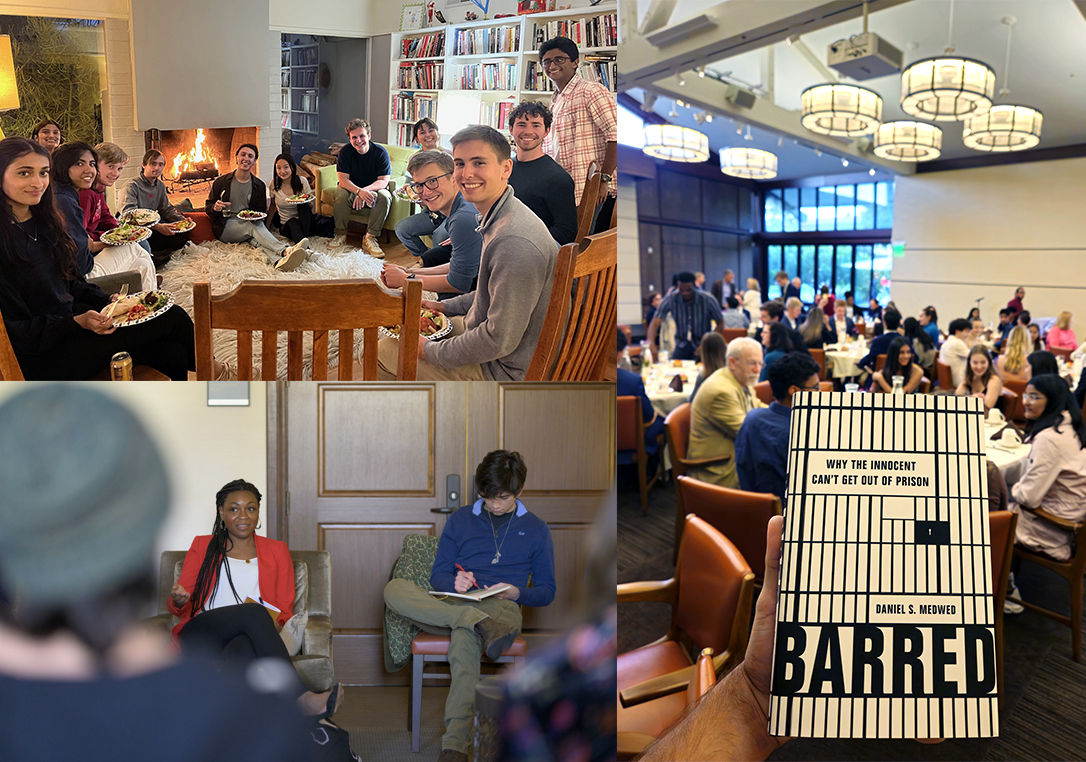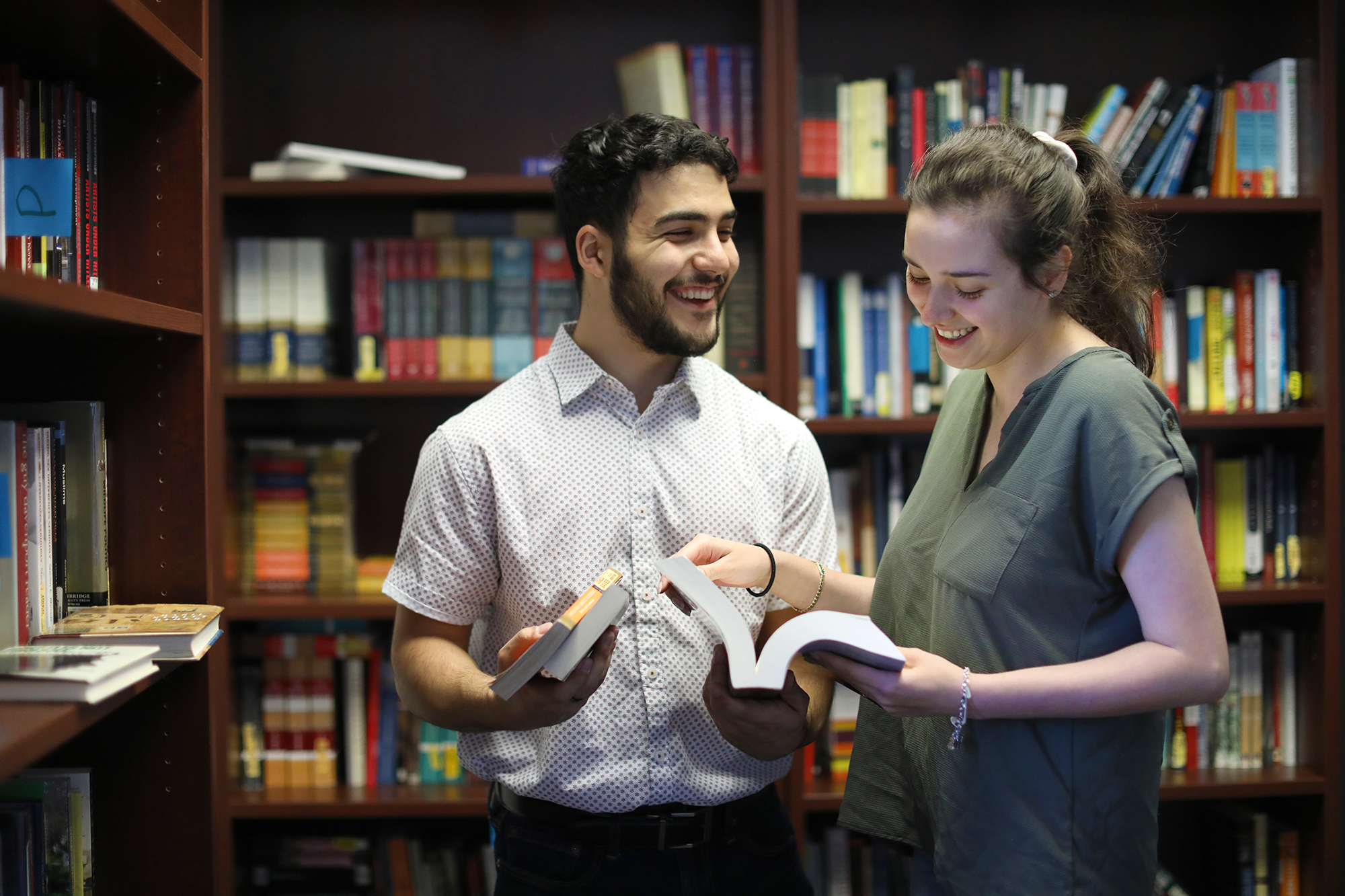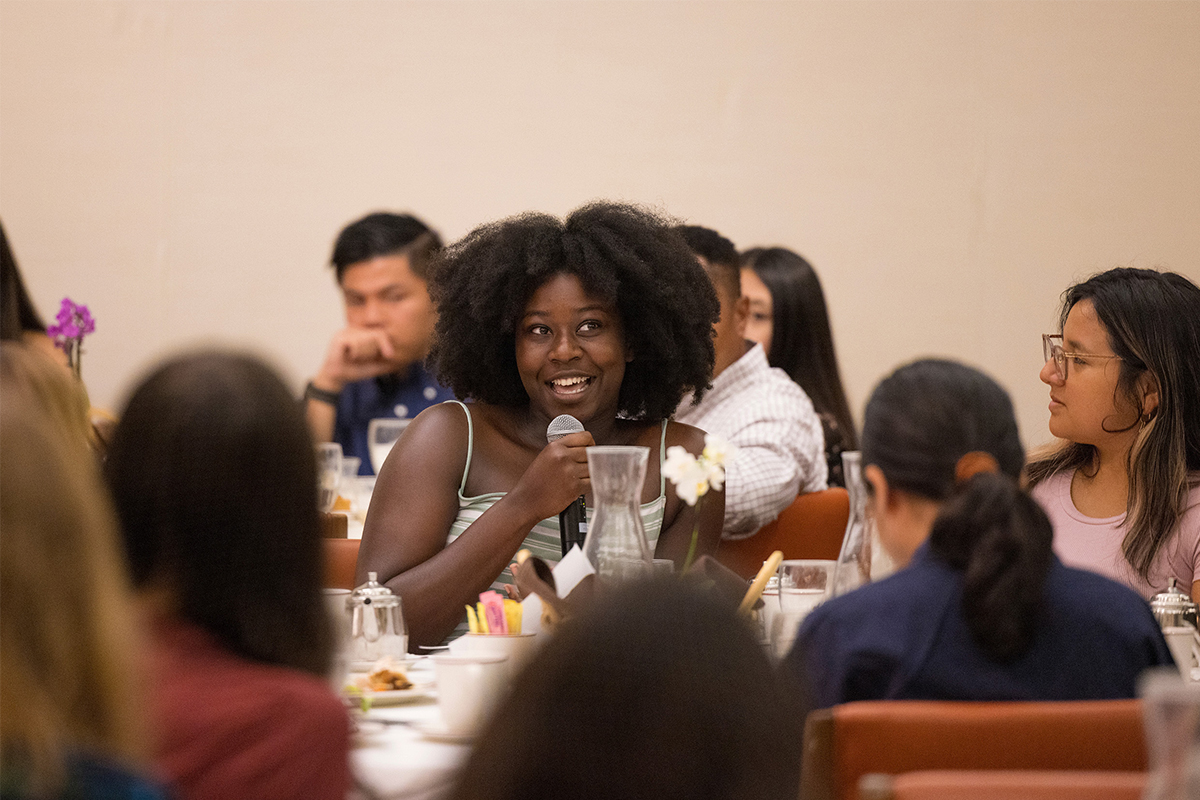
Our Programs

The Open Academy provides pervasive opportunities for students to build foundations, expand capabilities, and develop mastery of each of our commitments. As a campus-wide initiative, this learning happens across all spheres of the student experience: curricular, co-curricular, and extra-curricular.
Here are just a few of the many opportunities, initiatives,
courses, and centers tied to The Open Academy:
The Athenaeum
On any given night during the academic year, the Marian Miner Cook Athenaeum serves as an exemplar for how scholars, public figures, thought leaders, artists, and innovators engage with an eager campus audience on a range of important topics and diverse viewpoints. Whether it’s student fellows who are hired each year to steward programming and discussion, or attending students who excitedly socialize and share insights over lunch or dinner multiple times a week, the goal is to encourage life skills including leadership, dialogue, respect, and empathy.
Explore Athenaeum Speakers ios_share
“I want to do everything I can to support the Ath in its crucial mission of promoting constructive dialogue and intellectual curiosity. Many institutions of higher education purport to challenge their students to think critically and engage with ideas on the cutting edge, but the Ath is one place where this is done in practice.”
—Adrian Flynn ’25, Woolley Athenaeum Fellow
Saturday Salons
These small gatherings of faculty and students encourage discussions on topics curated by professors and research institutes. Topics have included criminal justice reform, teaching race and ethnicity in American high schools, the war in Ukraine, cryptocurrency, and the promise/limits of neoliberalism. The informal gatherings, which continue with dinner at a CMC professor’s home or in Claremont Village, help broaden views and create stronger bonding experiences.
Teas and Flipped Ath
The Open Academy has designed programming to take advantage of the Ath’s existing, daily tea time to offer students a more intimate conversation with faculty. To deepen dinner table conversation at the Ath, some Open Academy programs have also featured a “flipped” structure with the main discussion or panel program taking place before dinner. This allows students, faculty, and staff to have conversations about what they just heard while sharing the Ath meal.

The CARE Center
The CARE Center (Civility, Access, Resources, and Expression) is an innovative undertaking that proactively helps the CMC community develop the skills needed to have difficult conversations, identify with one another across social barriers or ideological difference, and engage in effective dialogue towards solutions and resolutions. Specifically, CARE provides students with a multitude of opportunities centered on identity awareness that reinforces skills in perspective building through cultural celebrations, deep dialogues on controversial topics, and various well-being efforts.

First and Second-Year Programming
The Open Academy hosts Ath dinners for first-year and sophomore students with faculty panels to introduce them to CMC values of asking good questions, active listening, respectful disagreement, and finding common purpose. Director Ioannis D. Evrigenis also works closely with the Dean of the Students Office on additional Orientation programming focused on the relationship between free speech, academic freedom, and viewpoint diversity within the educational environment of a liberal arts college.
Co-Teaching
The Open Academy models viewpoint diversity and constructive dialogue through a unique co-teaching model that challenges students to think critically about the world around them and to better understand and address points of view that confront their own opinions. Course examples include:
GOV 128 / SOC 128 JT: The University Black List
Co-taught by Jon Shields (Government) and Phil Zuckerman (Sociology at Pitzer College), this course explores contemporary contention over free speech, provides a window into the dangerous ideas of our time, and helps students think more deeply about the virtues and costs of censoring through the lens of books by disinvited authors.
ARBT 122 / RLST 122: Arab Cultural Histories, Islam, Literature, and Traditions: Past and Present
Co-taught by Professors Bassam Frangieh (Arabic) and Jamel Velji (Religious Studies), this course covers a wide swath of intellectual terrain from the premodern period to the present. Students are exposed to such diverse subjects as pre-modern Arabic poetry; how conceptions of time shape the study of Islamic subjects; Christian views of early Islam; and American views of Islam, among other topics.
Other Programs
Applied Seminars
The Salvatori Center for the Study of Individual Freedom offers intensive one-day, student-centered seminars that explore the philosophical roots of contemporary issues. Recent topics include “Conservative Intellectuals and American Constitutional Democracy” and “Free Speech on Campus.”
The Debate Union
One of the largest and most successful college debate programs in the country, the Debate Union emphasizes the importance of teaching argumentation as part of civil discourse. The group also hosts regular campus events, including debates, lectures, discussion panels, conferences, and advocacy training seminars.
The Dreier Roundtable
Named in honor of former Congressman David Dreier ’75, The Dreier Roundtable focuses on national politics, policy, and offers funding to support student internships in public service. The program’s Civility Award has been presented to former Montana governor Steve Bullock ’88, as well as to Colorado Governor Jared Polis and Utah Governor Spencer Cox.
Free Food for Thought
The student-led podcast—sponsored by the Ath—facilitates roundtables on freedom of expression and interviews guest experts about the inflection between their personal experiences and their professional accomplishments. Past guests include Fiona Hill, Martha Jones, Steven Pinker, and Michael Shear ’90.
Garris Dialogue Series
The Jerome H. Garris Dialogue Series features experts with opposing viewpoints speaking together on controversial topics. Students both observe and participate in the virtues of constructive dialogue with the curiosity and openness to engage in respectful ways.
Model UN
CMC’s Model UN Team provides peer training for the Presidential Initiative Intergroup Dialogue. One of the best Model UN teams in the country, CMC recently won the “Best Small Delegation” award at Harvard WorldMUN in Paris—considered to be the “Olympics of Model UN.”
Presidential Initiative Intergroup Dialogue
The Open Academy works in conjunction with the leadership of The Presidential Initiative on Anti-Racism and the Black Experience in America to facilitate teaching retreats. These retreats are intended to support faculty groups interested in sustained engagement and dialogue with one another, especially by teaching about viewpoint diversity and social difference.
Presidential Outreach
Noting that “a responsible civic life starts around dinner table discussions,” CMC President Hiram Chodosh regularly addresses CMC student and alumni audiences about the responsibility of higher education to prepare young people for an engaged civic presence—this, despite polarizing differences and fear, which often shut down a student’s ability to engage in tough topics.
Student Collaboration Project
The Open Academy partnered with CMC students and faculty on curricular innovation and engagement through a new project supported by a gift from Buzz Woolley ‘59 P’90 P’92. A two-week residential program helped underrepresented students learn about various topics, including moral foundations, criticism versus cancellation, and threat reduction.
Join Us
We seek strategic, programmatic, and philanthropic partners to advance the promise and potential of The Open Academy. Your partnership and support make this possible. Together, we can overcome what divides us and solve the world’s most challenging problems.
